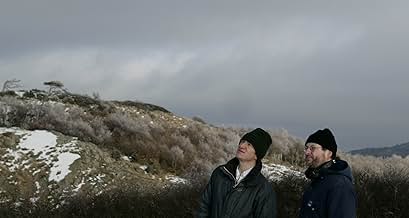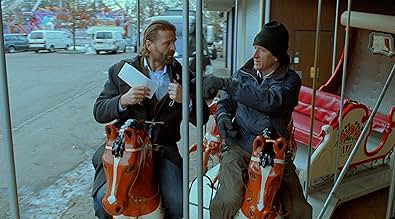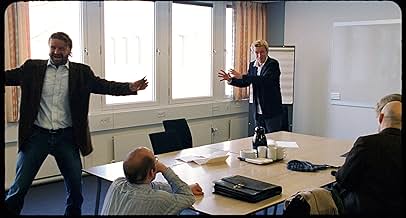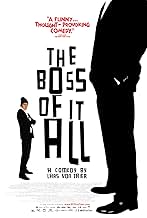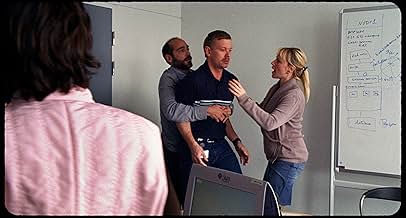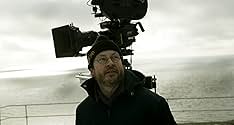VALUTAZIONE IMDb
6,6/10
13.158
LA TUA VALUTAZIONE
Una società di informatica assume un attore per ricoprire il ruolo di presidente dell'azienda per aiutare l'azienda a essere venduta a un irritabile islandese.Una società di informatica assume un attore per ricoprire il ruolo di presidente dell'azienda per aiutare l'azienda a essere venduta a un irritabile islandese.Una società di informatica assume un attore per ricoprire il ruolo di presidente dell'azienda per aiutare l'azienda a essere venduta a un irritabile islandese.
- Premi
- 1 vittoria e 7 candidature totali
Friðrik Þór Friðriksson
- Finnur
- (as Fridrik Thor Fridriksson)
Lars von Trier
- Narrator
- (non citato nei titoli originali)
Recensioni in evidenza
In Lars von Trier's small-scale, Automavision (computer-edited) Danish-language film comedy Ravm (Peter Gantzler) is the spineless (but mean) CEO of an IT company. He's such a people-pleaser he's hidden his real rank all along so the staff won't resent his more unpopular decisions. Now on the verge of selling the company out from under them, he calls in a "self-important, out-of-work" actor, Kristoffer (Jens Albinus) to play the role of "boss of it all"—be his front man by proxy to sign the papers. Lars himself pops up at the middle and end as a voice and at the beginning as a voice and a reflection—just long enough to mock himself and us. He also makes fun of Danes for their sentimentality and giggling and chatter, and, because the buyers of the company are Icelandic, he makes fun of Icelanders for their over-reliance on their ancient sagas and their petulant rages.
Americans don't take a beating this time, though there's one American member of the company cadre, Spencer (Jean-Marc Barr) who's completely ineffectual around the office because he can't finish a sentence in Danish. Lars has lots of fun with actors here, and of course with offices and corporate manipulations. Kristoffer has some kind of quixotic idol called Gambini whose "masterpiece" is a droning monologue of a chimney sweep. He puts soot on his forehead for luck when embarking on his role. As the boss, previously known to staff via e-mails only as Svend E., Kristoffer is completely inept, but the six-person startup cadre members nonetheless react to him as if he were the real deal and are variously ready to beat up, have sex with, or marry him. The women act like woman (with especially nice turns by Iben Hjejle and Mia Lyhne), and the men act like children. They weren't even meant to see him: that's just the first thing that goes wrong—due to the actor's excessive zeal, he goes and introduces himself. As he gets in deeper and deeper—with zero preparation—he finds himself constantly begging Ravm for secret coaching sessions "on neutral ground" (which includes the zoo). But these do nothing to limit his amazing ability to gum up the works for everybody, especially Ravm. Things turn farcical when Finnur's lawyer shows up and turns out to be Kristoffer's ex-wife, Kisser (Sofie Grabol). Will she give away the game?
This all makes a lot of sense if you've seen Von Trier's earlier film, the semi-documentary The Five Obstructions (2003), in which he and his film-making mentor Jørgen Leth teamed up to provide, indirectly, a kind of skeleton-key to his mind. The Dogme film-making "vow of chastity" reflects von Trier's own masochistic, Brechtian, but—given the grimness of some of his film content—surprisingly playful need to be forever imposing new rules and limitations that challenge actor, filmmaker, and audience. The Five Obstructions, where the director spars with mentor Leth, shows that he's also an affectionate and modest tease. "Although you can see my reflection, this film won't be worth a moment's reflection," is his personal opener to The Boss of It All.
That "moment's reflection" von Trier says we won't need suggests on the contrary how reflexive and clever all this actually is. The film, which could be seen as a sort of droll, deadpan parody of "The Office" (though von Trier says he hasn't even seen the TV series), is a set of characters and premises that create their own movie, just as the computer editing device does. And just as we're startled and appalled at times by the ugliness of shifting light and sound levels and pointless jump cuts the Automavision produced, von Trier and his actors may have been surprised at how some of the set-ups turned out. Will Svend, AKA Kristoffer, sign over the company to the growling Icelander, Finnur (Fridrik Thor Fridriksson)? Even he doesn't know. He has to "consult" his "character." And that makes him, like Lars, a big tease. 'The Boss of It All' may be more intriguing than funny—and there will be those, primed too intensely by 'Dogville' and 'Manderlay,' who'll see it as merely cruel and misanthropic, but it's a complete change from his recent stuff, and yet utterly in character.
Americans don't take a beating this time, though there's one American member of the company cadre, Spencer (Jean-Marc Barr) who's completely ineffectual around the office because he can't finish a sentence in Danish. Lars has lots of fun with actors here, and of course with offices and corporate manipulations. Kristoffer has some kind of quixotic idol called Gambini whose "masterpiece" is a droning monologue of a chimney sweep. He puts soot on his forehead for luck when embarking on his role. As the boss, previously known to staff via e-mails only as Svend E., Kristoffer is completely inept, but the six-person startup cadre members nonetheless react to him as if he were the real deal and are variously ready to beat up, have sex with, or marry him. The women act like woman (with especially nice turns by Iben Hjejle and Mia Lyhne), and the men act like children. They weren't even meant to see him: that's just the first thing that goes wrong—due to the actor's excessive zeal, he goes and introduces himself. As he gets in deeper and deeper—with zero preparation—he finds himself constantly begging Ravm for secret coaching sessions "on neutral ground" (which includes the zoo). But these do nothing to limit his amazing ability to gum up the works for everybody, especially Ravm. Things turn farcical when Finnur's lawyer shows up and turns out to be Kristoffer's ex-wife, Kisser (Sofie Grabol). Will she give away the game?
This all makes a lot of sense if you've seen Von Trier's earlier film, the semi-documentary The Five Obstructions (2003), in which he and his film-making mentor Jørgen Leth teamed up to provide, indirectly, a kind of skeleton-key to his mind. The Dogme film-making "vow of chastity" reflects von Trier's own masochistic, Brechtian, but—given the grimness of some of his film content—surprisingly playful need to be forever imposing new rules and limitations that challenge actor, filmmaker, and audience. The Five Obstructions, where the director spars with mentor Leth, shows that he's also an affectionate and modest tease. "Although you can see my reflection, this film won't be worth a moment's reflection," is his personal opener to The Boss of It All.
That "moment's reflection" von Trier says we won't need suggests on the contrary how reflexive and clever all this actually is. The film, which could be seen as a sort of droll, deadpan parody of "The Office" (though von Trier says he hasn't even seen the TV series), is a set of characters and premises that create their own movie, just as the computer editing device does. And just as we're startled and appalled at times by the ugliness of shifting light and sound levels and pointless jump cuts the Automavision produced, von Trier and his actors may have been surprised at how some of the set-ups turned out. Will Svend, AKA Kristoffer, sign over the company to the growling Icelander, Finnur (Fridrik Thor Fridriksson)? Even he doesn't know. He has to "consult" his "character." And that makes him, like Lars, a big tease. 'The Boss of It All' may be more intriguing than funny—and there will be those, primed too intensely by 'Dogville' and 'Manderlay,' who'll see it as merely cruel and misanthropic, but it's a complete change from his recent stuff, and yet utterly in character.
Lars von Trier's Danish-language comedy. It never interested me much, though I used to love von Trier (despite always acknowledging his numerous flaws). And it is definitely one of his least good films. If we ever find ourselves looking back at his career in the distant future, this one will not be mentioned much. It's about an out-of-work actor (Jens Albinus) who is hired by a company's CEO who is pretending only to be that company's lead lawyer (Peter Gantzler) to impersonate the mythical, unseen "boss of it all". Gantzler plans to sell off the company, as well as his employee's patents, to an Icelander (played by Children of Nature's director, Friðrik Þór Friðriksson), but he doesn't want to be identified as the guilty party, instead setting up this patsy to take the blame from his crazy co-workers (among whom is Iben Hjejle, whom you may remember from Stephen Frear's High Fidelity). The film is moderately amusing. Though many people seem to think von Trier's oeuvre consists mostly of tragedies, his work is more often darkly comic. The Boss of It All isn't nearly his funniest work. The Kingdom and The Idiots are both funnier, as is arguably Europa. Friðrik Þór Friðriksson actually provides most of the film's laughs as the thunderous, Dane-hating Icelander, recalling Ernst-Hugo Järegård's Dane-hating Swede from The Kingdom. But still, The Boss of It All is good, even if it will eventually just be a footnote.
This movie is undoubtedly an ideological departure from the recent LVT endeavours. It has no tear-jerking aspirations, except as a matter of laughs. In a way, it is self-ridiculing, adding an extra layer of hilarious logical traps. It is a bit slow in the third quarter, but then picks up. Special noteworthy inventions: the Icelandic buyer (a riot!), his translator, mythical Gambini and the "Hanged Cat"! Acting, acting, acting is very witty and plastic. It makes the piece (with mostly indoors setting) less cinematic, more of a filmed play (which is undoubtedly the intention of the director). Good entertainment and fairly original.
What a wonderful surprise this film was! I never expected a pretty straightforward satire from von Trier and Dogme, but I certainly got it. The plot sounds well-used and obvious but the way it was transferred to a Scandinavian IT culture, the distanced approach to character writing, improvisation, and superb acting and direction made it a great comedy. On reflection, what was really hilarious was the massively over-inflated self-importance of each and every character. Ali G. and Borat could learn a few things from these Danes (and one very irate Icelander).
As the end credits voice-over said, "Apologies to those who expected more, and to those who expected less. The others got what they deserved". I was glad to be one of the others.
As the end credits voice-over said, "Apologies to those who expected more, and to those who expected less. The others got what they deserved". I was glad to be one of the others.
This will be a little hard to understand, for those who are not familiar with Scandinavian office culture and enterprise democracy. For those who are, it's funny.
The unemployed actor gets a job. He's supposed to act as executive, during some sensitive business with an Icelandic buyer. It doesn't develop like he has imagined, but in fact it doesn't develop like anyone has imagined.
There's lots of kicking here in every direction and not at least against cultural snobbism. It's von Trier back to the basics, but not that easy to grip for people outside a Scandinavian environment.
The unemployed actor gets a job. He's supposed to act as executive, during some sensitive business with an Icelandic buyer. It doesn't develop like he has imagined, but in fact it doesn't develop like anyone has imagined.
There's lots of kicking here in every direction and not at least against cultural snobbism. It's von Trier back to the basics, but not that easy to grip for people outside a Scandinavian environment.
Lo sapevi?
- QuizThis movie is shot with camera technique called Automavision, an innovation in which the camera angles and movements are selected by a computer. The media notes explain technique, "a principle for shooting film developed with the intention of limiting human influence by inviting chance in from the cold". There are odd framings and jump cuts within scenes making everything seem a bit unsettled.
- ConnessioniFeatured in Smagsdommerne: Episodio #4.16 (2006)
I più visti
Accedi per valutare e creare un elenco di titoli salvati per ottenere consigli personalizzati
Dettagli
Botteghino
- Budget
- 3.000.000 € (previsto)
- Lordo Stati Uniti e Canada
- 51.548 USD
- Fine settimana di apertura Stati Uniti e Canada
- 7855 USD
- 27 mag 2007
- Lordo in tutto il mondo
- 3.111.395 USD
- Tempo di esecuzione1 ora 39 minuti
- Colore
- Mix di suoni
- Proporzioni
- 1.85 : 1
Contribuisci a questa pagina
Suggerisci una modifica o aggiungi i contenuti mancanti

Divario superiore
By what name was Il grande capo (2006) officially released in Canada in English?
Rispondi

